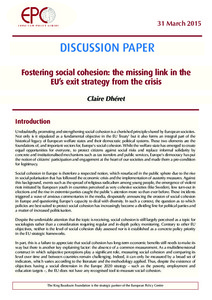Fostering social cohesion: the missing link in the EU's exit strategy from the crisis
"Social cohesion is a cherished principle in the EU. But after recent events, such as the emergence of violent riots in countries previously perceived as very cohesive, low voter turnouts in elections, and the rise of extremist political parties across the European continent, some have come to...
| Main Author: | |
|---|---|
| Institution: | ETUI-European Trade Union Institute |
| Format: | TEXT |
| Language: | English |
| Published: |
Brussels
2015
EPC |
| Subjects: | |
| Online Access: | https://www.labourline.org/KENTIKA-19113612124919318949-Fostering-social-cohesion-the-.htm |
| Summary: | "Social cohesion is a cherished principle in the EU. But after recent events, such as the emergence of violent riots in countries previously perceived as very cohesive, low voter turnouts in elections, and the rise of extremist political parties across the European continent, some have come to the conclusion that social cohesion in Europe is slowly but surely eroding. Despite the attention the topic is receiving from the media, it is still not seen as a vital part of the EU’s policy-making process; the EU has no tools to measure, let alone assess the levels of social cohesion among the member states, and their evolution over time. In this Discussion Paper, Claire Dhéret highlights the long-term detrimental effect the crisis is likely to have on social cohesion, in particular on young people. She also analyses its interaction with other economic and social indicators and argues that fostering social cohesion would be a way to facilitate the EU’s exit strategy from the crisis. Against this background, Claire Dhéret calls on the EU to consider social cohesion as a concrete policy priority in its strategic frameworks, and as a way to supplement the EU’s current approach to the crisis, which still predominantly focuses on fiscal consolidation." |
|---|---|
| Physical Description: | 15 p. Digital |

